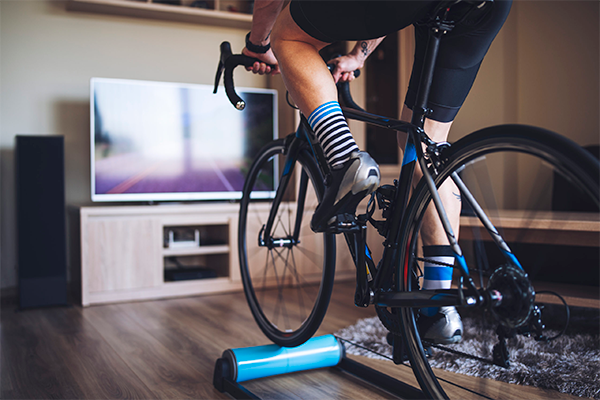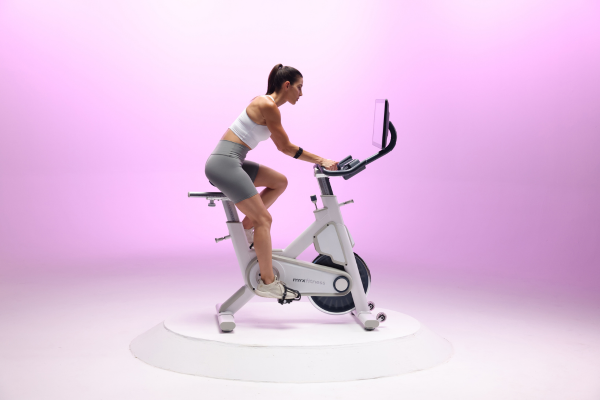Both indoor and outdoor cycling can provide an excellent workout. But each has its pros and cons. Considering that the best workout is generally the one you’ll do most consistently, you might want to weigh the advantages of indoor vs. outdoor cycling before you embark on a biking regimen.
Benefits of Cycling
Wherever you do it, a cycling workout provides several significant benefits. These are just a few of them:
1. It’s great cardio
“Primarily, cycling is a cardiovascular exercise, so you’re going to burn calories, strengthen your heart and strengthen your lungs,” says Melanie Melillo, NASM-CPT.
2. It can help with weight loss
“Cycling is great for weight maintenance and losing weight,” Melillo says. Adding resistance to the flywheel (if you’re cycling indoors) or choosing more challenging terrain (if you’re outdoors) can help build muscle mass.
“When you have more muscle in your body, you have a more active metabolism. You’re going to burn more calories at rest,” she explains.
3. It can help you tone up and get stronger
Cycling is resistance training, which can help you build defined lower-body muscles — particularly the glutes, hamstrings, quads, and calves. If you have knee problems or a past injury, it’s a better cardio choice than running — cycling can strengthen the muscles and stabilize the joints around your knees.
Now let’s look at what the experts say about the unique benefits of indoor cycling vs. outdoor.
Indoor Cycling Benefits
From a pure workout standpoint, indoor cycling takes the edge over outdoor cycling. Here’s why:
1. Safety
Outdoor cycling has its hazards depending on where you live — and the accompanying road conditions, availability of bike lanes, and proximity to trails.
“Indoor cycling is definitely safer,” Melillo. “You’ve never heard of anybody falling off their indoor bike and getting hit by a car.”
2. Convenience
Hopping on an indoor bike at home can be more convenient than gearing up for an outdoor ride — there’s no heaving your bike down apartment stairs or transporting it to a favorite trail if your neighborhood is full of potholes.
And whether you cycle at home or a gym, the weather is never an excuse to skip.
“The main advantage of an indoor bike is not having to deal with the elements,” says Kate Meier, a certified USA Weightlifting trainer and CrossFit Level 1 trainer in Waxhaw, North Carolina. “With outdoor cycling, the weather will have a say in if you’re able to go for a ride or not.”
Eliminating potential excuses can help you work out more consistently.
3. Control and customization of your workout
Indoor cycling allows you to control the resistance on the bike, enabling you to work out as hard or easy as you like with the flick of a wrist.
“With indoor cycling, you control the terrain, and by doing that, you’re also controlling the workout,” Melillo says. “You’re getting exactly out of the workout what you need for that given day.”
For example, if you’d like to do a recovery ride or lower-intensity ride, “a lot of times you can’t find that kind of terrain outside — a stretch of flat road that will take you for 10 miles. Whereas inside, you can create that terrain,” Melillo says. “If you’re looking for a really hard workout in a short period of time, it can be hard to find that outside as well.”
Also, if you’ve only got minutes to spare, you can hop on an indoor bike and do a targeted workout. “I say that 15 minutes is enough to change not just your mood but to consistently change your body,” Melillo says. “To jump on and get a really efficient endurance ride, HIIT ride, or even recovery ride — you really can’t do that outside.”
4. Motivation
Indoor cycling can incorporate any or all of the following: a class leader, other gymgoers, shouted instructions, and serious beats — all of which can encourage you to push yourself harder.
“A huge differentiator is that when you’re riding indoors, a lot of it is done to music,” Melillo says. “If you’re motivated by music, and you love to listen to music when you ride, indoors is a much safer place to do that.”
Outdoor Cycling Benefits
If you’re looking for a good workout that gives you a reason to head outside, you might lean more towards outdoor cycling. Here are some of its benefits.
1. Fresh air and variety
“Outdoor cycling has the benefit of being outdoors in the fresh air, which is a much-needed release every so often,” Smith says. “You also get the benefit of natural resistance and terrain changes which challenge your body in different ways than an indoor cycle does.”
2. Scenery
Does working out indoors bore you? “If you’re someone who enjoys cardio better outside or actually traveling across distances, the outdoor bike will be better,” Meier says.
3. In-person connection
Riding outdoors can be a great excuse to meet up with friends or family or to schedule a long-postponed day out. There are even websites where you can meet other cyclists and go for group rides!
Which Burns More Calories: Indoor or Outdoor Cycling?
“For the same amount of time, cycling indoors is likely to burn more calories than cycling outdoors,” says Todd Buckingham, Ph.D., an exercise physiologist and former world champion triathlete in Grand Rapids, Michigan.
“When you ride your bike outside, you have to stop at lights, stop signs, and for traffic. Cycling indoors eliminates those barriers and allows you to cycle continuously for the same amount of time.”
“Speaking from personal experience as well as from feedback I’ve gotten from my clients, indoor cycling wins for the best calorie burn,” concurs Tami Smith, an ACE-certified personal trainer, and avid cyclist in Williamstown, Massachusetts.
“Most indoor cycling classes are made to challenge and push you in ways that you might not be intrinsically motivated to do while out on the road with your bike. Outdoor cycling tends to be more of a steady-state cardio workout, whereas indoor cycling, especially when taking a class, tends to be a more high-intensity cardio workout which will burn more calories in a shorter amount of time,” she adds.
But like all workouts, you’ll only get back what you put in. “When you’re inside, if it gets hard, you do have the opportunity to turn down your resistance a little bit and make it a little bit easier,” Melillo says. “Whereas outside, you don’t really have that. If there’s a hill in your way, you got to get to the top of it.”
Indoor vs. Outdoor Cycling: Which Is Right for You?
Consider these factors:
Time
Does your packed schedule force you to skip workouts? “If you have 20 minutes to get your workout in, you’re probably going to get in a more efficient workout on an indoor bike ride than you would in an outdoor bike ride,” Melillo says.
Safety
“I think for a lot of people, outdoor safety is a big consideration,” Melillo says. “Do you have a safe place to ride outside? Are you lucky enough to live somewhere where the roads are great?”
Weather
Do you live in a place where it gets very cold in the winter or hot in the summer? That might affect your outdoor workout consistency.
Motivation
“Do you want to feel the interactivity and accountability that comes with training on an indoor cycle with a spin coach guiding and pushing you through the workout?” Smith says. “Or do you prefer to do your own thing and get out and connect with nature?”
Goals
“The best option depends on your goals,” Meier says. “If you’re trying to prepare for cycling races or triathlons, you’ll need to ride outside to be the most prepared. If just getting a consistent workout in and burning calories is the most important, then the indoor bike should be the main option.”
Indoor vs. Outdoor Cycling Equipment
Among the most important considerations when deciding between cycling indoors or outdoors is equipment. Here are some tips on choosing the right gear.
Can you use a road bike indoors?
If you already own a road bike and are wondering about its adaptability indoors, there are ways that allow you to bring your workout inside, but they will require extra equipment.
Indoor bike trainers, which enable you to prop up your bike and add resistance to the wheels, range in price from a couple hundred bucks to well over a thousand dollars. If you opt for a smart indoor bike trainer, you can also connect to cycling apps like Zwift and TrainerRoad.
These offer cycling workouts, tracking, analytics, training tools, and access to virtual cycling communities.
Is a spin bike like a road bike at all?
How closely your indoor bike resembles a road bike depends on the type of indoor bike you’re riding, explains Garret Seacat, C.S.C.S., head coach of Absolute Endurance. Right now, there are currently two types of indoor bikes:
- Spin bikes
- Stationary bikes
“A spin bike uses some kind of resistance knob the rider turns to make it harder,” Seacat says. This means that while you might pedal this bike the same way you pedal an outdoor bike, much of the user experience will be different.
Indoor bike trainers, however, offer an experience more like that of a road bike. “An indoor trainer provides more of a true bike ride feel with the ability to change gears to apply resistance,” Seacat says. “Most use third-party apps to give you a workout.”
What types of indoor cycling bikes are good for training?
If you’re looking for a true road bike experience, it can cost up to $3,000 to adapt an outdoor bike for indoor use. But what if you’d rather not make such a hefty investment in an indoor bike? Are there cheaper alternatives?
“You can totally get a more run-of-the-mill stationary bike, but by doing that, you typically run into two minor problems,” Seacat says:
- Limited fit customization
- The type of resistance
Most indoor bikes only allow minimal adjustments to the seat placement. However, both the seat and handlebars of the BODi Bike by MYX move up and down and forward and backward, comfortably accommodating riders from 4’11” to 6’8?. Similar to a road bike, this feature allows the user to achieve the fit that’s perfect for them.
As for resistance, depending on your personal preference, you’ll decide between friction and magnetic technologies. The first involves the use of a brake pad to regulate tension on the flywheel and is typically more affordable, while the latter employs magnets to apply resistance and is generally more expensive.
BODi Bike by MYX
The BODi Bike by MYX delivers a higher level of comfort, durability, and cost-effectiveness than other bikes in its class. It comes with a state-of-the-art sensor that tracks speed, cadence, and distance throughout your workout so you can continue to make progress with every single ride.
And now with BODi, you can use the bike’s 360-degree swivel screen to access all of BODi’s live and on-demand programming! From equipment to results-focused workouts, the home studio system provides everything you need to get healthy, fit, and strong right from home.







